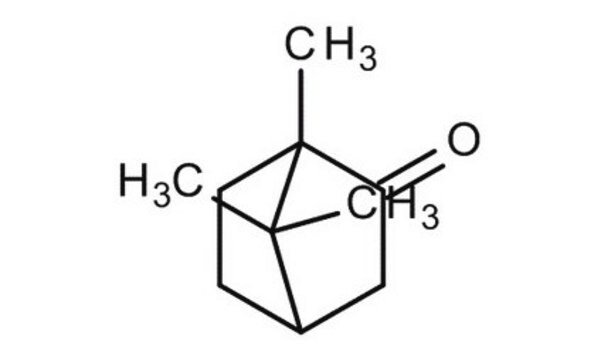1087508
USP
Camphor
United States Pharmacopeia (USP) Reference Standard
Sinónimos:
D-Camphor, 2-Bornanone, 2-Camphanone
About This Item
Productos recomendados
grado
pharmaceutical primary standard
densidad de vapor
5.24 (vs air)
presión de vapor
4 mmHg ( 70 °C)
familia API
methyl benzylidene camphor
temp. de autoignición
870 °F
lim. expl.
3.5 %
fabricante / nombre comercial
USP
mp
178-182 °C (lit.)
aplicaciones
pharmaceutical (small molecule)
formato
neat
cadena SMILES
CC1(C)[C@@H]2CC[C@@]1(C)C(=O)C2
InChI
1S/C10H16O/c1-9(2)7-4-5-10(9,3)8(11)6-7/h7H,4-6H2,1-3H3/t7-,10+/m1/s1
Clave InChI
DSSYKIVIOFKYAU-XCBNKYQSSA-N
¿Está buscando productos similares? Visita Guía de comparación de productos
Descripción general
Aplicación
- Camphorated Phenol Topical Gel
- Camphorated Phenol Topical Solution
- Eucalyptus Oil
Nota de análisis
Otras notas
Producto relacionado
Palabra de señalización
Danger
Frases de peligro
Consejos de prudencia
Clasificaciones de peligro
Acute Tox. 4 Inhalation - Eye Dam. 1 - Flam. Sol. 2 - Skin Irrit. 2 - STOT SE 2 Inhalation
Órganos de actuación
Lungs
Código de clase de almacenamiento
4.1B - Flammable solid hazardous materials
Clase de riesgo para el agua (WGK)
WGK 1
Punto de inflamabilidad (°F)
147.2 °F - closed cup
Punto de inflamabilidad (°C)
64 °C - closed cup
Certificados de análisis (COA)
Busque Certificados de análisis (COA) introduciendo el número de lote del producto. Los números de lote se encuentran en la etiqueta del producto después de las palabras «Lot» o «Batch»
¿Ya tiene este producto?
Encuentre la documentación para los productos que ha comprado recientemente en la Biblioteca de documentos.
Los clientes también vieron
Nuestro equipo de científicos tiene experiencia en todas las áreas de investigación: Ciencias de la vida, Ciencia de los materiales, Síntesis química, Cromatografía, Analítica y muchas otras.
Póngase en contacto con el Servicio técnico












